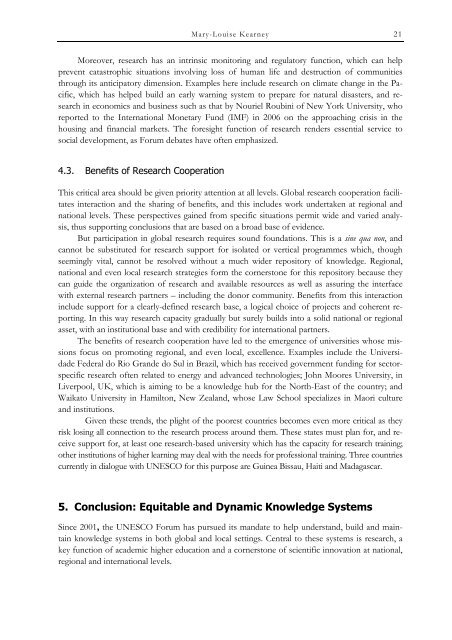Higher education, research and innovation ... - unesdoc - Unesco
Higher education, research and innovation ... - unesdoc - Unesco
Higher education, research and innovation ... - unesdoc - Unesco
You also want an ePaper? Increase the reach of your titles
YUMPU automatically turns print PDFs into web optimized ePapers that Google loves.
Mary-Louise Kearney 21<br />
Moreover, <strong>research</strong> has an intrinsic monitoring <strong>and</strong> regulatory function, which can help<br />
prevent catastrophic situations involving loss of human life <strong>and</strong> destruction of communities<br />
through its anticipatory dimension. Examples here include <strong>research</strong> on climate change in the Pacific,<br />
which has helped build an early warning system to prepare for natural disasters, <strong>and</strong> <strong>research</strong><br />
in economics <strong>and</strong> business such as that by Nouriel Roubini of New York University, who<br />
reported to the International Monetary Fund (IMF) in 2006 on the approaching crisis in the<br />
housing <strong>and</strong> financial markets. The foresight function of <strong>research</strong> renders essential service to<br />
social development, as Forum debates have often emphasized.<br />
4.3. Benefits of Research Cooperation<br />
This critical area should be given priority attention at all levels. Global <strong>research</strong> cooperation facilitates<br />
interaction <strong>and</strong> the sharing of benefits, <strong>and</strong> this includes work undertaken at regional <strong>and</strong><br />
national levels. These perspectives gained from specific situations permit wide <strong>and</strong> varied analysis,<br />
thus supporting conclusions that are based on a broad base of evidence.<br />
But participation in global <strong>research</strong> requires sound foundations. This is a sine qua non, <strong>and</strong><br />
cannot be substituted for <strong>research</strong> support for isolated or vertical programmes which, though<br />
seemingly vital, cannot be resolved without a much wider repository of knowledge. Regional,<br />
national <strong>and</strong> even local <strong>research</strong> strategies form the cornerstone for this repository because they<br />
can guide the organization of <strong>research</strong> <strong>and</strong> available resources as well as assuring the interface<br />
with external <strong>research</strong> partners – including the donor community. Benefits from this interaction<br />
include support for a clearly-defined <strong>research</strong> base, a logical choice of projects <strong>and</strong> coherent reporting.<br />
In this way <strong>research</strong> capacity gradually but surely builds into a solid national or regional<br />
asset, with an institutional base <strong>and</strong> with credibility for international partners.<br />
The benefits of <strong>research</strong> cooperation have led to the emergence of universities whose missions<br />
focus on promoting regional, <strong>and</strong> even local, excellence. Examples include the Universidade<br />
Federal do Rio Gr<strong>and</strong>e do Sul in Brazil, which has received government funding for sectorspecific<br />
<strong>research</strong> often related to energy <strong>and</strong> advanced technologies; John Moores University, in<br />
Liverpool, UK, which is aiming to be a knowledge hub for the North-East of the country; <strong>and</strong><br />
Waikato University in Hamilton, New Zeal<strong>and</strong>, whose Law School specializes in Maori culture<br />
<strong>and</strong> institutions.<br />
Given these trends, the plight of the poorest countries becomes even more critical as they<br />
risk losing all connection to the <strong>research</strong> process around them. These states must plan for, <strong>and</strong> receive<br />
support for, at least one <strong>research</strong>-based university which has the capacity for <strong>research</strong> training;<br />
other institutions of higher learning may deal with the needs for professional training. Three countries<br />
currently in dialogue with UNESCO for this purpose are Guinea Bissau, Haiti <strong>and</strong> Madagascar.<br />
5. Conclusion: Equitable <strong>and</strong> Dynamic Knowledge Systems<br />
Since 2001, the UNESCO Forum has pursued its m<strong>and</strong>ate to help underst<strong>and</strong>, build <strong>and</strong> maintain<br />
knowledge systems in both global <strong>and</strong> local settings. Central to these systems is <strong>research</strong>, a<br />
key function of academic higher <strong>education</strong> <strong>and</strong> a cornerstone of scientific <strong>innovation</strong> at national,<br />
regional <strong>and</strong> international levels.

















